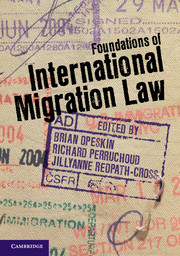Book contents
- Frontmatter
- Summary contents
- Detailed contents
- Preface
- List of case studies
- List of boxes
- List of figures
- List of maps
- List of tables
- Notes on contributors
- Abbreviations
- 1 Conceptualising international migration law
- 2 Contemporary patterns of international migration
- 3 Sources of international migration law
- 4 Nationality and statelessness
- 5 State sovereignty and freedom of movement
- 6 International human rights of migrants
- 7 Refugees and asylum
- 8 Women, children and other marginalised migrant groups
- 9 Human trafficking and smuggling
- 10 International migration by sea and air
- 11 International labour migration
- 12 International trade law and labour mobility
- 13 Global migration institutions and processes
- 14 Regional processes, law and institutional developments on migration
- 15 Emerging legal issues in international migration
- Appendix 1 Cases
- Appendix 2 Treaties and other international instruments
- Glossary
- Index
- References
13 - Global migration institutions and processes
Published online by Cambridge University Press: 05 November 2012
- Frontmatter
- Summary contents
- Detailed contents
- Preface
- List of case studies
- List of boxes
- List of figures
- List of maps
- List of tables
- Notes on contributors
- Abbreviations
- 1 Conceptualising international migration law
- 2 Contemporary patterns of international migration
- 3 Sources of international migration law
- 4 Nationality and statelessness
- 5 State sovereignty and freedom of movement
- 6 International human rights of migrants
- 7 Refugees and asylum
- 8 Women, children and other marginalised migrant groups
- 9 Human trafficking and smuggling
- 10 International migration by sea and air
- 11 International labour migration
- 12 International trade law and labour mobility
- 13 Global migration institutions and processes
- 14 Regional processes, law and institutional developments on migration
- 15 Emerging legal issues in international migration
- Appendix 1 Cases
- Appendix 2 Treaties and other international instruments
- Glossary
- Index
- References
Summary
INTRODUCTION
A complex array of international institutions and processes has emerged around migration in recent decades. This is partly a function of the increasingly globalised and interlinked nature of human mobility, and partly a response to the level of attention devoted by governments to international migration. Sending States are concerned about the rights of their nationals abroad, and receiving States are concerned about meeting their labour market needs. Despite growing awareness of the interdependence of migration experiences across regions and countries, little progress has been made towards an effective, coherent system of global migration governance. There continues to be an absence of shared vision, leadership and political will for migration policy making at the international level, which makes it difficult to develop appropriate structures and laws to regulate and coordinate international responses to global human mobility.
Attention to migration differs dramatically among governments, in terms of institutions and policies. Even within a single government, there can be a wide range of policies and practices across temporary and permanent categories of migration. The autonomy of governments to deal with their own migration challenges, combined with the lack of a single body of international law on migration or a global entity to cohere their practice, has left a governance vacuum. In contrast to trade, labour, environment and health, there are no regular global fora in which ministers responsible for migration meet to discuss issues of common concern, although this does occur in some regions.
- Type
- Chapter
- Information
- Foundations of International Migration Law , pp. 336 - 365Publisher: Cambridge University PressPrint publication year: 2012



